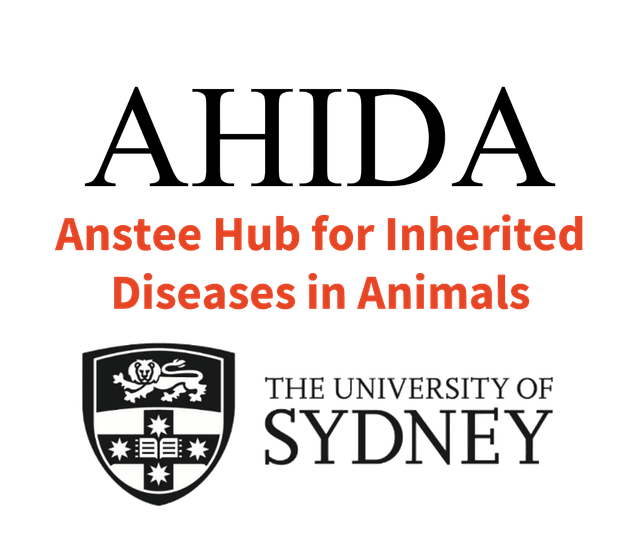The AHIDA project
Background
Inherited diseases are often rare but their cumulative impact is substantial. For humans, the global reference compendium (Online Mendelian Inheritance in Man, OMIM) includes more than 5,600 monogenic (single-gene) inherited diseases. Most of these could also occur in any animal species. To date, however, only a relatively small number of inherited monogenic diseases has been described in any of the major domesticated animal species (for details see OMIA, the global reference compendium for inherited diseases in animals).
Population genetics modelling and whole genome sequence analyses suggest that all humans and animals are likely to be carriers of multiple deleterious alleles, further highlighting that inherited diseases pose a significant risk to health and welfare.
In animal populations, inbreeding and/or small effective population size increase the risk for recessive diseases: deleterious allele frequencies can increase rapidly if particular sire lines are widely used. The result is that the risk of occurrence of inherited diseases is greater in animals than in humans. Furthermore, inherited diseases in animals are often misdiagnosed and/or under-reported. There is a lack of reporting structures, and many animal breeders fail to report suspected inherited conditions to their breed societies due to concern for damage to reputation.
However, if an emerging disease is actually an inherited disease, effective mating plans can be implemented to reduce the risk of affected animals being born, either by predicting genotypes by advanced pedigree analysis or by implementing DNA diagnostics once the disease-causing mutations have been identified. Control of inherited diseases by these means has a direct effect on betterment and welfare of animals.
Australia previously had no centralised resource for surveillance, reporting and control of inherited diseases in animals. Researchers at the University of Sydney received funding from the Ronald Bruce Anstee Bequest to develop such a centralised resource in 2021.
Objective
The objective of the Anstee Hub for Inherited Diseases of Animals (AHIDA) is to provide the best possible means for preventing and/or controlling inherited diseases in animals throughout Australia by:
- Establish and maintain an Australia-wide surveillance and reporting resource for inherited diseases in animals
- Disseminate information on inherited diseases and, more generally, on the incidence/occurrence of inherited diseases and of their control, to veterinarians, breed societies and the public, mainly via OMIA
- Develop recommendations regarding prioritisation of emerging inherited diseases for research and control, based on evidence-based information
- Facilitate undergrad/postgrad research projects on the highest-priority inherited diseases, led by species-focused teams of clinicians, pathologists and geneticists, with the aim of enabling control, preferably by DNA tests
- Providing a direct route for improving collaboration with stakeholder groups, and increasing the impact of University of Sydney research to benefit the Australian community and Australian agriculture
The AHIDA team
- Imke Tammen (A. Prof., Sydney School of Veterinary Science, Faculty of Science, The University of Sydney)
- Claire Wade (Prof., School of Life and Environmental Sciences, Faculty of Science, The University of Sydney)
- Julie Zids (Dr., AHIDA project Manager, Sydney School of Veterinary Science, Faculty of Science, The University of Sydney)
- Bianca Waud (A. Prof., Sydney School of Veterinary Science, Faculty of Science, The University of Sydney)
- Marina Godoy Gimeno (Research affiliate, Sydney School of Veterinary Science Faculty of Science, The University of Sydney)
- Brandon Velie (Lecturer, School of Life and Environmental Sciences, Faculty of Science, The University of Sydney)
- Frank Nicholas (Emer. Prof., Sydney School of Veterinary Science, Faculty of Science, The University of Sydney)
- Brendon O’Rourke (Team Leader Biotechnology, Elizabeth Macarthur Agricultural Institute (EMAI) NSW Department of Primary Industries)
- Mary Thompson (Associate Professor, Sydney School of Veterinary Science, Faculty of Science, The University of Sydney)
- Marius Mather (Data Scientist, Sydney Informatics Hub, The University of Sydney)
Funding
AHIDA is named in recognition of a very thoughtful bequest from the late Ronald Bruce Anstee “for research in genetic and inherited diseases in animals and for the betterment of welfare of animals”. The Ronald Bruce Anstee Bequest supported the development of AHIDA from 2021-2023 and provides ongoing funding until 2026.
